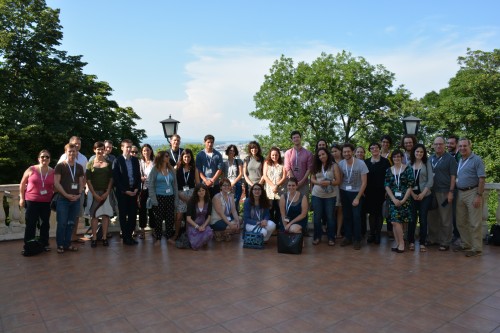Our eight-day tour to Budapest provided René Cassin Fellows with an unparalleled opportunity to look at a country of poignant contradictions.
Located in the heart of what was once Nazi-occupied Europe, Budapest now boasts an exciting renaissance of Jewish life. In addition, Hungary is a country that, from 1947 to 1989, was ruled by a Communist dictatorship under the influence of the Soviet Union. Yet in 1956 Hungarians rose up in a democratic revolution that caught the imagination of the world. Since 1989 Hungary has been a democratic republic, but recent political trends have raised serious concerns about a move back towards repressive and anti-democratic policies.
We looked at Hungary as a case study in the challenges of contemporary human rights. We met a full range of people and institutions – public officials, political activists, NGOs, religious leaders and Jewish activists – to explore the challenges facing a country where civil liberties and human rights are at serious risk.
The Budapest Study tour is the only time that all of the RCFP Fellows – from the US, UK and Israel – are together in real time. Given the very different political and social realities of the three regions, Fellows learned as much from one another as from the array of speakers. We gave considerable time to building the bonds and deepening the relationships between members of the group. These relationships will continue through the on-going cross-regional chevrutot that will convene monthly.
How was it for you? Fellows reflect on the Budapest trip
- “It was really empowering to feel part of a global Jewish community that cares about human rights.” – Naama Weinberg, Israel
- “A wonderful, inspiring week. I hope that it’s a springboard for the future and an avenue to change.” – James Masters, UK
- “This program must continue. I have never has such a compressed experience with so much growth, so much learning and such a powerful connection to Jews across the planet.” – Mike Schwartz, US
- “I learned that being committed to Judaism does not have to be in conflict with my commitment to human rights. Human rights can actually enhance my Jewish identity based on what I learned from the Jewish tradition.” – Carolina Rios Mandel, Israel
- “The study tour has caused me to think more about my future role in human rights work and the extent to which I’d like to connect it overtly with my Jewish identity.” – Hannah Schraer, UK
Eight full days in Budapest – the RCFP study tour itinerary
Monday 8 June – Arrival in Budapest
- Welcome and icebreakers in the Israeli Cultural Institute
- Jewish Perspectives on Human Rights – Rabbi Sid Schwarz
- Zionist/Israeli Perspective on Human Rights – Elan Ezrachi
Tuesday 9 June – The Legacy of the Holocaust for Human Rights
- Tour of Holocaust Memorial Centre
- Jewish Life in Europe: A 75-year Perspective – Dr Zsofia Kata Vincze, ELTE University
- Introduction to Human Rights – Dénes Balázs, Director, Open Society Foundations
- The European Human Rights System – Dr Eszter Polgár, Central European University
Wednesday 10 June – Racism and Discrimination in Europe
- Political Scapegoating in Contemporary Hungary – Éva Simon, TASZ (Civil Liberties Union).
- Gender and Politics in Hungary – Dr Andrea Pető, Central European University
- LGBT issues in Hungary – Tamas Dombos, LGBT Program Director, Háttér Foundation
- Protecting Human Rights for Europe’s Minorities – Anna-Mária Bíró, Tom Lantos Institute
Thursday 11 June – The Roma
- The situation of the Roma in Central Europe – Katalin Barsony, Romedia.
- Tour of Roma Ghetto in Bag – led by students from Roma NGO, Bagázs, followed by briefing and community service.
- Tour of the Roma neighbourhood of Budapest with the UCCU Foundation – Joci Marton
- The Rise of Extremism – Dr Peter Kreko, Political Capital
Friday 12 June – Homelessness, Jewish Budapest
- Tour of the Jewish Quarter – Tamas Buchler
- Human Rights for Homeless People – Dr Tessza Udvarhelyi, AVM Foundation
- Visit to Aurora Center (Jewish cultural and community centre) – Adam Schoenberger, Eszter Susan
- Shabbat services
- Shabbat dinner
Shabbat 13 June
- Text study – Rabbi Sid Schwarz
- Parshat haShavua sessions led by Fellows
- Emerging Jewish Options in Eastern Europe – Lutza Elek, Moishe House; Andrea Ausztrics, Dor Chadash; Gábor Majer, Teleki Shul; Bogi Palko, Young Adult Unit, Federation Of Hungarian Jewish Communities
- Havrutot meetings
- Havdalah led by Fellows
Sunday 14 June – Refugee Rights and Human Trafficking in Hungary
- Fragmentation and Jewish Identity: Jews, Judaism and Tzedek – Rabbi Sid Schwarz
- Refugee Policy – Zoltan Somogyvari, Hungarian Helsinki Committee; Behrooz, MIGSZOL
- Human Rights Education – Peter Neumann, Haver Foundation; Flora Laszlo, UCCU Foundation
- Jewish Community Activism for Social Justice – Mircea Cernov, Joint Distribution Committee
Monday 15 June – Closing Session and Evaluation
- Morning gathering
- Final group conversation
- Evaluations

